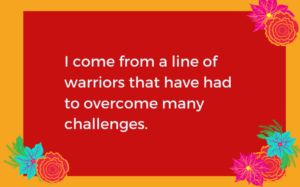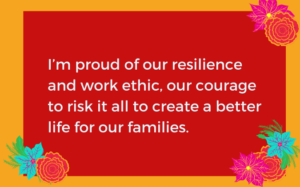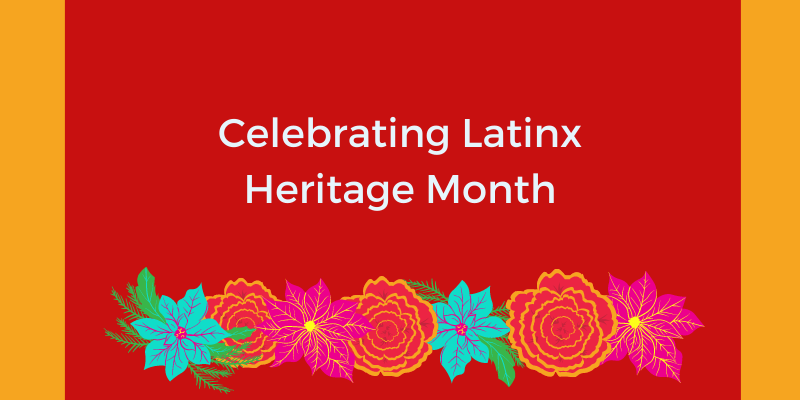Celebrating Latinx Heritage Month: Our Stories Part One
Posted by Chiara Wegener
As Latinx Heritage Month comes to a close, we’d like to share some reflections from Nellie Mae’s staff and board members on what their heritage means to them. Read these personal and important stories below.
DELIA ARELLANO-WEDDLETON, DIRECTOR OF ENGAGEMENT AND PARTNERSHIPS: MI HISTORIA
I identify as Mejicana, Chicana and Latina and I often deal with the tension that comes from being a first-generation American. There is an expression — ‘Ni de aqui, ni de alla’ which describes how I often feel. I don’t always feel that I belong in this country, but I know that I don’t belong in Mexico either.
My family comes from Guanajuato Mexico and belongs to the Guamare Indigenous community. That history gives me great pride and strength. I come from a line of warriors that have had to overcome many challenges.
I value showing up as who I am 100%, be it my accent, my brown skin, or the straight hair that connects me to my indigenous roots.

I find pride in the stories that have been passed down to me, whether it is about curanderas or stories that show the strength of my people. These stories give me strength.
I find great joy, knowing that I’ve fulfilled my parents’ American dream and that they can look down and say’ ‘mija you have done us well’. I find joy in passing the torch to my children, nieces, and nephews so that we don’t lose our stories.
The youth give me esperanza. Historically, social movements have been led by youth and there are many great examples of how Chicanos, Latinos have been leading change. For example, the 1968 high school walkouts in LA, the Young Lords, and the farmworker huelgas.
Youth are having difficult conversations that other generations haven’t had, whether it is about LGBTQ rights, anti-Blackness in the Latinx community, or climate change. They are our hope and I’ll always support them.
MARCOS LUCIO POPOVICH, PROGRAM DIRECTOR OF GRANTMAKING: MY REFLECTIONS
My family comes from San Luis Potosi and Jalisco, Mexico. For several generations (probably beginning in the late 1800s), my family began traveling from Mexico to harvest crops throughout the United States. They were migrant farmworkers working in Texas, Ohio, Oregon, and everywhere in between, picking cotton, tomatoes, plums. My grandmother would say that they were not rich in material things, but that they were rich in faith, rich in family, and rich in culture. She taught me to be proud of being Mexican, of being Mexicano, even when the world told us otherwise. She taught me to be proud of our culture, language, and history, and to be proud of the many contributions we’ve made to the U.S. even though it is not written in our history books.
I’m proud of our resilience and work ethic, our courage to risk it all to create a better life for our families. I pray that when history is written about our current times that we don’t forget to recognize the contributions of migrant farmworkers during this pandemic. They fed our country while working under dangerous conditions.

When I went to college, I met other Latinos that shared similar experiences: Puerto Ricans, Peruvians, Dominicans, Salvadorans. While we each had our own unique histories and cultures, we realized that we faced similar challenges, had similar interests, and that by creating a bond across our various cultures, we could create power, political power, power that can effectuate change. “In unity, there is strength” was our motto. “In unity, there is strength.”
I carry that with me today. No matter what we call ourselves, Hispano, Latino, Latinx, Chicano, Borinquen, we are stronger when we are united. And, we need to continue to find ways to bridge divides, build community, be inclusive and grow the movement for our collective liberation.
Latinos will soon make up 30% (2050) of the U.S. population. My hope is that we foster a people that knows and remembers its history, maintains its pride in its culture and language, rejects assimilation and welcomes acculturation, has opportunities to thrive and succeed, and charts a new and better path forward. The next generation of activists brings me to hope that this is possible. “Si, se puede.” Yes, we can!
WHILE LATINX HERITAGE MONTH ENDS AFTER TODAY,
we think it’s important to celebrate Latinx heritage year-round. Therefore, lookout for the next part in our series coming soon.
Additionally, we understand that language is ever-evolving — and how individuals with Latinx heritage describe themselves varies. We understand this complexity and invite you to learn more here.

